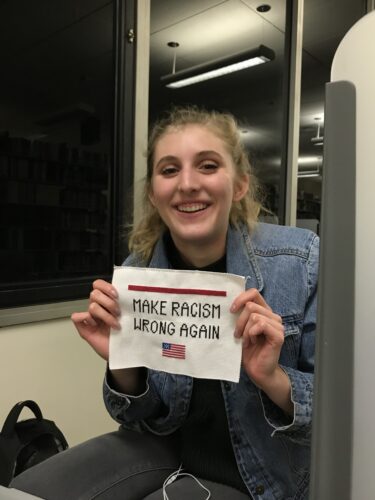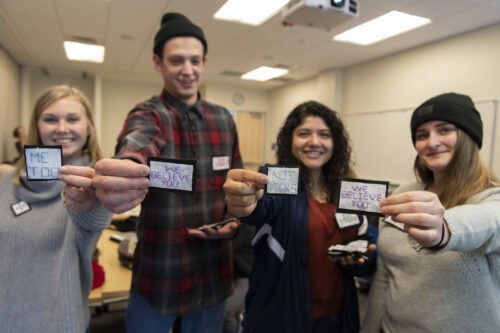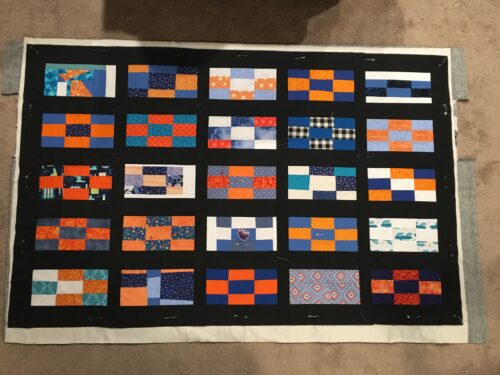
Julianne Wenner got a dream opportunity not long after the 2016 presidential election: to devise a seminar for the Honors College on any topic she wanted.
Professor Shelton Woods helped with the brainstorming by asking Wenner a key question: if you woke up at 4 a.m. and had the whole day ahead of you and could read and learn about whatever you wanted, what would it be?
“It was shortly after the election and activism was in the air,” said Wenner, an assistant professor in Curriculum, Instruction and Foundational Studies, and coordinator for the Graduate Certificate in Teaching, Elementary Pathway in the College of Education.
“I love sewing and crafting. And pussy hats came around,” said Wenner, referring to the knit pink hats that appropriated crass language in the now-infamous audio recording of Donald Trump.
She immersed herself in “tons of research.” Then, with the help of the Course Design Institute at the Center for Teaching and Learning, she distilled her research into a class, “Stitches of Resistance,” in partnership with the university’s Service-Learning Program.
A group of 25 students – 20 women and five men with a mix of majors, from business to education – have spent the past semester exploring the history of craft and needlework as a form of activism, or “craftivism.”
“Craftivism is a new term for something that has been going on around the world for centuries,” said Wenner.
Her class studied crafts used for protests, including banners sewn and carried by suffragettes. They studied crafts used to raise money or awareness of an issue – for instance, the temperance quilts popular around the turn of the last century with symbolic imagery and colors to discourage alcohol consumption and AIDS quilts with squares memorializing people who had died.
“The KKK also made fundraising quilts, so that goes to show you craftivism has not always been on the right side of history,” said Wenner.
While reading texts like “Craftivism: The Art of Craft and Activism,” and “Knitting for Good!” by Betsy Greer, students studied stitched codes used by World War II prisoners of war to criticize their captors, and arpilleras, narrative quilts sewn by women in Chile to protest the murderous regime of Augusto Pinochet.

And of course, Wenner asked students to try their own hand at craftivism.
Wenner led “Skills Labs” throughout the course so students could learn basic needlework skills. They learned to use sewing machines with help from the MakerLab in the College of Innovation and Design.
“Three fourths of the students had never lifted a needle,” said Wenner, adding that one of her students is in the habit of sending clothing items in need of mending home to their grandmother in California.
“They had serious doubts, but they rallied,” said Wenner.
Assignments during the semester included embroidering positive messages to leave around town for people to find, and creating a square for a class quilt. The squares, quilted by Wenner, became a quilt for Project Linus, a national nonprofit with a local chapter that gives handmade blankets to kids in need.

For their final projects, presented in class Dec. 4, students devised a local craftivism project focused on a cause of their choice. Causes ranged from the environment, to animal welfare, to food insecurity and others.
Boise State student Noelle Johnson, who has her own Etsy craft store, chose to embroider buttons to wear against sexual harassment reading “No Means No,” “We Believe You,” “Not Yours,” etc. She’s going to sell them at a local pop-up shop with proceeds benefitting the FACES of Hope Victim Center in downtown Boise.
During her presentation, Johnson talked about generating creative ideas for a cause: “Figure out what your passions are and start there. The ideas will come and you will connect with others who share those passions.”